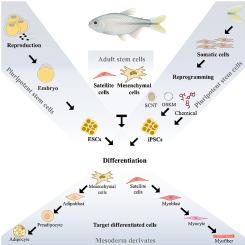Advances in fish cell reprogramming and Differentiation: A pathway to alternative proteins
IF 15.4
1区 农林科学
Q1 FOOD SCIENCE & TECHNOLOGY
引用次数: 0
Abstract
For decades, fish have been used as valuable models and innovative targets for cell reprogramming technologies, as their tissue regenerative capacity and physiological cell features make them a promising tool for both basic and applied studies. While much of the focus has been on mammalian sytems, research in aquatic organisms, especially fish, offers opportunities for innovation in cell sourcing and large-sclae cultivation. For the food industry, this exploration is particularly relevant, as it supports the development of cultured fish meat. This article reviews the manipulation of adult and fish stem cells and the latest techniques used in the emerging field of fish cell reprogramming, including cloning and integrative and non-integrative methods to induce pluripotency, highlighting recent advances and potential applications. The generation of induced pluripotent stem cells (iPSCs) from fish species for subsequent in vitro cell differentiation opens new opportunities for regenerative medicine, animal conservation, and the production of alternative proteins that promise to address global food security challenges. Thus, fish cells could enable the development of this emerging technology for the production of cultured fish meat, strengthening the links between biotechnology, environmental science, and food production as an innovative and sustainable solution.

鱼类细胞重编程和分化的研究进展:通往替代蛋白的途径
几十年来,鱼类一直被用作细胞重编程技术的有价值的模型和创新靶点,因为它们的组织再生能力和生理细胞特征使它们成为基础和应用研究的有前途的工具。虽然大部分焦点集中在哺乳动物系统上,但对水生生物,特别是鱼类的研究,为细胞来源和大鳞片培养的创新提供了机会。对于食品工业来说,这一探索尤其重要,因为它支持了养殖鱼肉的发展。本文综述了成体和鱼类干细胞的操作,以及在新兴的鱼类细胞重编程领域中使用的最新技术,包括克隆和整合和非整合方法诱导多能性,重点介绍了最近的进展和潜在的应用。从鱼类中产生诱导多能干细胞(iPSCs)用于随后的体外细胞分化,为再生医学、动物保护和替代蛋白质的生产提供了新的机会,有望解决全球粮食安全挑战。因此,鱼细胞可以促进这种新兴技术的发展,用于养殖鱼肉的生产,加强生物技术、环境科学和食品生产之间的联系,作为一种创新和可持续的解决方案。
本文章由计算机程序翻译,如有差异,请以英文原文为准。
求助全文
约1分钟内获得全文
求助全文
来源期刊

Trends in Food Science & Technology
工程技术-食品科技
CiteScore
32.50
自引率
2.60%
发文量
322
审稿时长
37 days
期刊介绍:
Trends in Food Science & Technology is a prestigious international journal that specializes in peer-reviewed articles covering the latest advancements in technology, food science, and human nutrition. It serves as a bridge between specialized primary journals and general trade magazines, providing readable and scientifically rigorous reviews and commentaries on current research developments and their potential applications in the food industry.
Unlike traditional journals, Trends in Food Science & Technology does not publish original research papers. Instead, it focuses on critical and comprehensive reviews to offer valuable insights for professionals in the field. By bringing together cutting-edge research and industry applications, this journal plays a vital role in disseminating knowledge and facilitating advancements in the food science and technology sector.
 求助内容:
求助内容: 应助结果提醒方式:
应助结果提醒方式:


